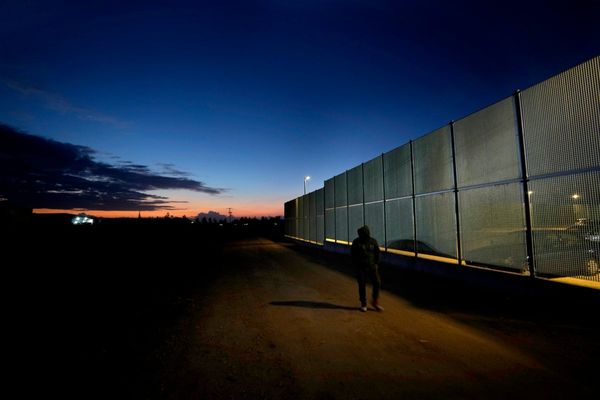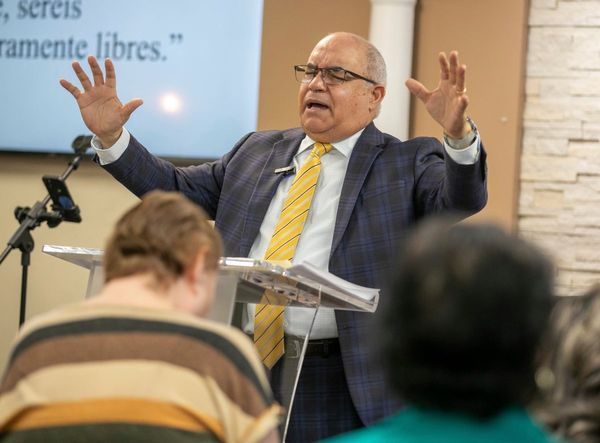As Prince Philip's body now lies in rest at Windsor Castle, thousands of kilometres away in the Pacific there are some who believe that his spirit will now return to them.
For decades, people in several small villages on the Vanuatu island of Tanna have revered the Duke of Edinburgh, believing the prince was the physical representation of an ancient warrior leader.
"He is the spirit of kastom so we pray through the sacred kava ritual," a spokesman for Yaohnanen village, Jimmy Joseph Nakouo, said.
Since news of his death filtered through — mostly by international journalists — people in the villages of Yakel and Yaohnanen have come to pay their respects.
At Yaohnanen village, the Union Jack flag flew at half-mast and hundreds of people took part in a small ceremony under a large banyan tree in the centre of the village, called a nakamal, or meeting place.
Men drank kava — a traditional beverage popular in many Pacific island countries — which is made from the kava plant's ground roots and has a mildly euphoric effect.
It is a significant part of Vanuatu's "kastoms", the country's traditional cultures and customs.
Jean Pascal Wahe, who works at the Vanuatu Cultural Centre, visited both villages this week.
"They are sorry [to hear of his death] but they're also glad because they say his body will remain in the UK but his spirit will return to Tanna," he said.
But there are also questions now as to who might take on the special relationship they had with Prince Philip.
The centre of an ancient prophecy
In 1974, Queen Elizabeth and Prince Philip visited the New Hebrides, before it became Vanuatu, where the Prince handed over a white pig to a member of the Tanna community during an event in the capital, Port Vila.
Anthropologists said the gift catapulted him into the centre of a long-running prophecy that has its roots in the clash of culture between the early European missionaries and the traditional tribes.
People in the villages of Yakel and Yaohnanen have an ancient legend that tells of a group of warriors who left, a long time ago, to fight a war on a faraway island so as to preserve their culture.
"The spirit of kastom tried to protect people from Christianity … [the spirit] told the people, 'I need to go to the source of the threatening'," Mr Nakou said.
According to the prophecy, the leader of the group vowed to one day return with a rich, powerful and white wife.
This is how the islanders saw Prince Philip and Queen Elizabeth's visit in 1974, believing him to be a physical representation of the ancient warrior leader returning home.
It is believed that the Prince's gift of the pig allowed the people of Yaohnanen and Yakel to form a strong link with him.
They wanted him to live in their villages and followers, who are estimated to now stand at around 400, patiently waited for his return.
Kirk Huffman, an anthropologist who has known members of the Prince Philip movement since the 1970s, said it is common for tribes on Tanna to believe in prophecies or "visions".
"These sorts of visionary movements have been going on … for centuries," Mr Huffman said, who is also an honorary curator of Vanuatu's National Museum.
He said that such beliefs play an important role in Tannese culture, which "doesn't follow linear logic and they don't have to because there are lots of other logical systems around".
"In the white man system, we're all brought up on this jolly stupid linear education system which blinds us to this whole much wider view of reality."
But he said the world's interest in the Prince Philip movement has also played a role.
"The more film crews that arrive, the more supporters they get. It's a sort of self-fulfilling prophecy, in a way".
There was regular correspondence between Prince Philip and his followers dating back to the late 1970s and in 2007, five members of the community visited him for a meeting at Windsor Castle as part of a UK Channel 4 television series.
Prince Charles could be possible successor
While Prince Philip's followers believe that his spirit will now return to Tanna, they have also held discussions about his possible successor.
Kirk Huffman said that in line with Vanuatu culture — where the customs dictate that the chiefly titles are passed on to male descendants — they might transfer their allegiance to the next in line, Prince Charles.
Cultural officer Jean Pascal Wahe said that followers have not yet made any decisions but would leave the matter to the Royal family.
"They've said that if [Prince] Charles wants to continue to hold this title … and maintain the connection, then that would be fine," he said.
"But if not, the spirit of Prince Philip would go into one of his other adult children, or a grandchild, and in the future, they could continue the connection".
But anthropologist Kirk Huffman said it was likely the group would continue to use the name of Prince Philip.
He said he was also recently advised that it may even become a political movement, following in the footsteps of another group, the John Frum Movement, which is also on the island of Tanna.
"They stand in the local elections, they have a Member of Parliament," he said.
"What's going on is actually traditional internal power politics. Clan alliances … jealousies, all sorts of stuff. That's fascinating."
Additional reporting by Evan Wasuka and Stevie Zhang.







